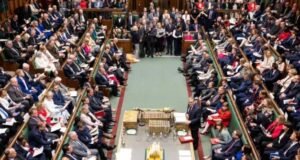 Watching Nigel Farage and David Cameron debate Brexit is like opening a DC comic to find the Joker taking on Lex Luthor – they’re both so deeply flawed and thoroughly unpleasant characters you don’t care who wins. Tonight, neither was convincing and neither connected. Charmless and churlish, Farage is like one of those contrarian relatives you desperately try to avoid at a family gathering. Mansplaining, patronising and hectoring, he trolled the questioners, seeking not to persuade but pummel.
Watching Nigel Farage and David Cameron debate Brexit is like opening a DC comic to find the Joker taking on Lex Luthor – they’re both so deeply flawed and thoroughly unpleasant characters you don’t care who wins. Tonight, neither was convincing and neither connected. Charmless and churlish, Farage is like one of those contrarian relatives you desperately try to avoid at a family gathering. Mansplaining, patronising and hectoring, he trolled the questioners, seeking not to persuade but pummel.
Cameron was less annoying but not more engaging. Like a financial adviser trying to sell you a policy you don’t really need, he implored the audience to “think about their children and grandchildren” – not great tailoring for a campaign desperate to enthuse young voters, which is just as well because there were precious few in the audience. His desperate attempts to convince the audience that he’d secured major concessions during negotiations prior to the referendum fell flat.
Neither was helped by the format, in which some questions rambled and most questioners interjected before an answer could be given. The overall effect illustrated the trouble with the whole campaign so far – people talking over each other, but rarely to each other.
If stylistically Cameron was smoother (the bar was set pretty low), strategically Farage had the best of him. Cameron doesn’t seem to have noticed that there is an anti-establishment mood sweeping through the west. Citing experts and boasting about how the political class stands at one with business, unions and the IMF are little comfort to many people who blame those same elites for the financial mess we’re in.
Since few minds were changed, ultimately who came off best will hinge on what issue drives people to the polls. If in two weeks’ time most people vote on the economy, Cameron will have had a good night. If they vote on immigration, then Farage will claim victory. Tonight, they both looked like losers.
No contest, the prime minister swept the floor and dominated the night with all the advantage of the authority of his office. But is that enough? This vote isn’t a choice between these two men as leader – but visions of the country. Time and again, David Cameron came back to one theme – whose country do you want, the little England of Nigel Farage, or a Great Britain in the EU?
This is the final battle for those vital 4 million undecideds; hearts and minds more likely swayed at this late stage by mood music than by weighing up the broad probability of greatest risk. Immigration, sovereignty and foreign criminals were the inevitable challenges to Cameron, and well handled on the whole. Voters who rank them first will certainly already have fixed views. The economy, the future, risk of recession were Cameron’s best hope.
The leavers were spitting teeth at Farage representing them, rebarbative to many, unlikely to swing waverers. He faced clever, well-informed questions from the audience – a bit too clever and bloodless, but that tied him to technicalities, with less chance to roll out his bestselling snake-oil remedies. He took a direct hit with an accusation of stirring up fear and discrimination. But as the polls inch towards Brexit, the undertow feels on his side.
Why are we here, staring into this abyss, in a country roiled with an unexpected uprising of xenophobia? The best question was the first to Cameron: if leaving the EU is so dangerous, why did you offer a referendum? He reaps the whirlwind of his reckless attempt at appeasing the wilder side of his party. And so does the country he knows he has put in needless peril. Yes, we would survive Brexit, but we would not thrive, he said.
Slugging it out for undecideds, Cameron starts with a small advantage: YouGov finds among them, he is slightly less unpopular than Farage. How strange for Labour supporters to watch all this, rooting for Cameron.
This is a referendum about Britain’s place in the world. It is about whether we as a country believe we should have a cooperative future with our closest neighbours, one that will amplify our power to be constructive and engaged on a world stage while sustaining the prosperity and stability of our neighbourhood.
The mythical extraterrestrial observer asked to describe the ITV debate between Nigel Farage, David Cameron and a polite and well-informed studio audience would more probably interpret it as a vote on who can come into the UK, or perhaps about who should lead the Tory party. Or just possibly about the national economy.
There was a single thrilling moment when Cameron spoke passionately about the case for Europe. He was rewarded with a round of applause. But he is always compromised by the question that if he felt so unequivocally that remaining in the EU was a good thing, why had he risked Britain’s membership by using a referendum as a mere instrument of party management?
And Nigel Farage, who got a tougher ride and anyway can’t compete with the silky facility of a Cameron performance, is – like all the Brexiters – skewered by trying to argue that the EU is simultaneously an omnivorous beast that on 24 June will set about imposing an EU army to which Britain will be forced to contribute, and also on the point of collapsing under its own weight. There was a moment when even he seemed flummoxed by the contradictions of his case.
Cameron outperformed Farage just as the main Brexit campaign had anticipated when they protested so angrily about the ITV line-up. Of course, no one believed the prime minister when he told the final questioner, who asked if he was finished if he lost, that it was not a vote about individuals and tried to sustain (without challenge) the absurd fiction that if the vote went against him, he would obey the result. But it allowed him to brag about the broad coalition in favour of staying in while implying that the out campaign was personified by Farage.
There are plenty of people who like Farage, and they will have shared his sense of grievance that the audience was stacked against him. But if there is anyone out there who really is listening to the arguments, and maybe even looking for guidance about where Britain should stand in the world, then David Cameron is more likely to have persuaded them that he has the answers.
 Weekly Bangla Mirror | Bangla Mirror, Bangladeshi news in UK, bangla mirror news
Weekly Bangla Mirror | Bangla Mirror, Bangladeshi news in UK, bangla mirror news







